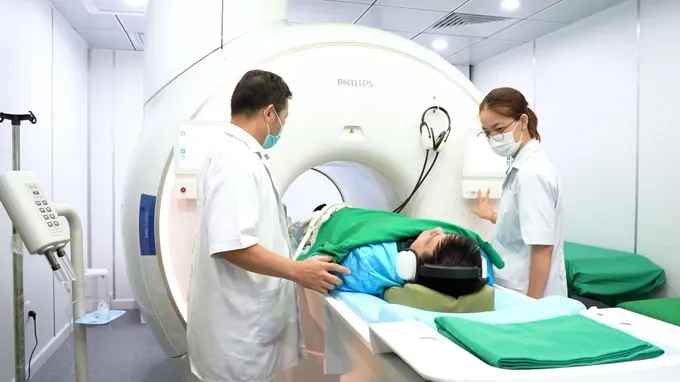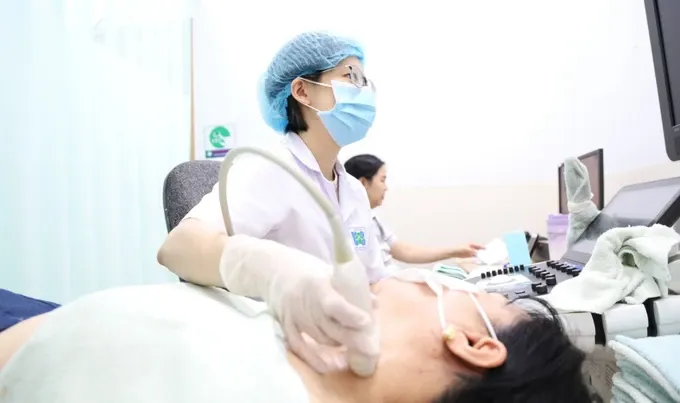
The potential impact of such a free-hospital-fee policy is already resonating deeply with individuals facing the harsh realities of medical costs. Just days ago, 38-year-old C.V.L. from Ben Tre Province was transferred to Cho Ray Hospital in HCMC in critical condition with complications from acute kidney failure, requiring urgent dialysis. His wife shared their plight as freelance laborers without health insurance, struggling financially with two school-aged children.
“My husband is gravely ill, needing expensive medications and advanced techniques, leading to enormous hospital fees”, L.’s wife expressed. “Illness is something no one wishes for, but contracting it can easily lead to destitution. The State’s new policy aiming for free hospital fees for the people is incredibly wonderful, demonstrating immense humanism from our country.”
Similarly, 65-year-old Nguyen Thi Ha from Ha Nam Province recounted her experience being transferred to Bach Mai Hospital in Hanoi for treatment of a coronary artery blockage. While she possesses a health insurance card, it does not fully cover all medical expenses. The cost of supplementary medications alone amounts to tens of millions of VND, not to mention travel and living expenses during her hospitalization. With the proposed policy, she harbors hope that her medical costs will be significantly alleviated.
According to Assoc Prof Dao Xuan Co, MD PhD, Director of Bach Mai Hospital, a leading special-grade facility for severe cases, the daily patient volume is immense, sometimes reaching 10,000. Many patients, particularly from remote or impoverished areas, face treatment and living expenses as a significant burden.
He considers the policy advocating for periodic health checkups and progressing towards free hospital fees for all citizens profoundly correct. However, successful implementation necessitates foundational investment in the primary healthcare network, strengthening basic services at the grassroots level.
Strategic planning for specialized facilities and enhancing human resources training are also essential. He emphasizes the current administrative rearrangement is an opportune moment to concentrate resources and reorganize the grassroots system for greater public accessibility.

Following the General Secretary’s directive, the Ministry of Health is actively drafting a proposal for the Government to submit to the Politburo for a resolution on breakthroughs in public healthcare, including solutions for universal free hospital fees. Concurrently, it is developing circulars to expand health insurance benefits, increasing payment for medical technical services, medicines, and medical equipment towards being free for designated beneficiaries.
Regarding the implementation trajectory, from 2026 to 2030, the Ministry of Health plans to research and propose to the Government the issuance of a decree guiding the piloting of several policies. These include expanding the benefits within the basic healthcare service package, increasing coverage by 20-30 percent relative to the basic salary level (currently 15 percent). Simultaneously, the Ministry advocates for a comprehensive amendment of the Health Insurance Law.
Healthcare experts comment that achieving the ambitious goal of universal free hospital fees hinges on leveraging various funding streams, namely the health insurance fund, the state budget, and social investment initiatives. Crucially, realizing this requires accelerating the current progress towards universal health insurance coverage.
Alongside funding, establishing stringent management mechanisms for medical examination and treatment activities and promoting economic practices are vital to combat waste within the health insurance fund. Experts also stress the urgent need for the Ministry of Health to issue the basic healthcare service package, defined by the Health Insurance Law as essential for public healthcare but currently still lacking.
Statistics from Vietnam Social Security (VSS) indicate that over 94 percent of the population nationwide is currently enrolled in health insurance, with 95 percent of health-insurance-covered hospital beds located in public hospitals. VSS has contracted with approximately 13,000 public and private healthcare facilities, ensuring widespread access to medical services for citizens.
VSS Deputy Director Nguyen Duc Hoa noted health insurance coverage is expanding, including expensive medications and modern supplies for critical illnesses. Referencing the General Secretary’s roadmap for free hospital fees by 2030, he stated VSS is on the right track towards universal health insurance. He commented that free fees and universal health insurance access demonstrate the Party and State’s dedication to achieving social equity in public healthcare.
Assoc Prof Do Van Dung, MD PhD, former Dean of the Faculty of Public Health (University of Medicine and Pharmacy at Ho Chi Minh City), shared that universal free hospital fees represent a highly progressive and humanistic policy with significant implications for the nation’s socio-economic development. It promises not only equity and happiness for citizens but also contributes to Vietnam’s overall socio-economic advancement.
However, implementing universal free hospital fees is a long-term objective contingent upon stable and sustainable socio-economic growth. Even now, it is entirely feasible, and indeed advisable, to begin by waiving or reducing hospital fees for those facing exceptional difficulties. If universal free hospital fees are not immediately achievable, waiving and eliminating co-payment requirements for the poor and those in exceptionally difficult circumstances through health insurance purchase support and utilizing the state budget for the remaining costs should be prioritized.
Nguyen Khac Phuong, living in Tan Binh District of HCMC, expressed his view that waiving hospital fees will undoubtedly alleviate financial burdens, enabling all citizens to access basic healthcare services without hesitation. This prospect is precisely why a large segment of the population eagerly awaits and places great hope in this humanistic policy.
This represents a breakthrough decision aimed at strengthening social welfare and expanding healthcare opportunities for all segments of society. Simultaneously, it serves as clear evidence of a significant transformation in the mindset governing the nation, one that firmly places its people at the center.
























